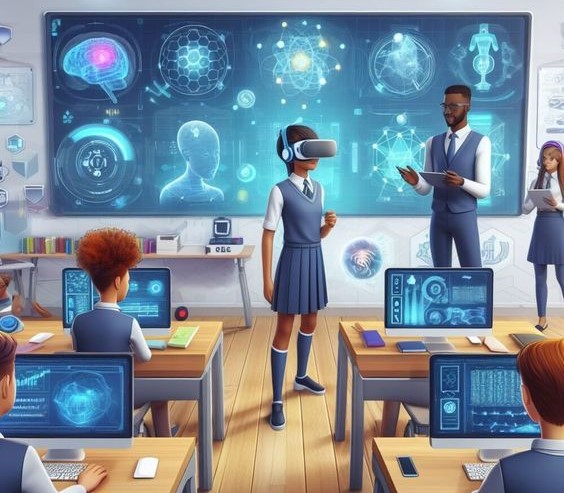The world of academic research is undergoing a seismic shift, propelled by the rise of artificial intelligence (AI). No longer a futuristic concept, AI is actively shaping how researchers formulate hypotheses, gather data, analyze results, and disseminate their findings.
This article delves into the multifaceted world of AI in academic research. It explores the potential benefits, inherent challenges, and ethical considerations of AI in academia.
The Rise of AI in Academic Research
The allure of AI in academic research lies in its ability to process vast amounts of data, identify complex patterns, and automate tedious tasks, capabilities that were previously unimaginable. This opens up exciting avenues for researchers across diverse disciplines. The use of AI in academic research can realize many possibilities including;
Enhanced Literature Review and Hypothesis Generation: Sifting through mountains of existing research is a cornerstone of academia. However, it can be incredibly time-consuming. AI-powered tools like Semantic Scholar are changing the game by using natural language processing (NLP) to analyze massive datasets of academic publications. They can also identify relevant articles, summarize key findings, and even suggesting potential research gaps and hypotheses.
Revolutionizing Data Collection and Analysis: AI algorithms can automate data collection from diverse sources, including online repositories, sensors, and social media. This ability proves particularly valuable in fields like astronomy, environmental science, and social sciences, where researchers grapple with enormous datasets. Moreover, machine learning algorithms excel at identifying subtle patterns in complex data, potentially uncovering insights that might elude human researchers.
Accelerating Experimentation and Simulation: AI can significantly accelerate the research process by optimizing experiments and running complex simulations. In drug discovery, for instance, AI models can predict the efficacy and potential side effects of drug candidates, streamlining the development process. Similarly, in fields like climate science and materials science, AI-powered simulations can model complex phenomena, leading to a deeper understanding of these systems.
Personalized Learning and Research Support: AI has the potential to personalize the learning and research experience for both students and academics. Intelligent tutoring systems can adapt to individual learning styles, providing tailored feedback and support. Meanwhile, AI-powered research assistants can help researchers with tasks like scheduling meetings, managing citations, and even drafting manuscripts.
Navigating the Challenges: Addressing the Limitations of AI

While the potential benefits of AI in academic research are undeniable, it is also crucial to acknowledge the associated challenges and limitations:
Data Bias and Fairness: AI algorithms are susceptible to inheriting and amplifying biases present in the data they use. This can lead to skewed research outcomes, particularly in fields like social sciences and healthcare, where biased data can perpetuate societal inequalities.
Lack of Transparency and Interpretability: Many AI models operate as "black boxes," making it difficult to understand how they arrive at their conclusions. This lack of transparency poses challenges for researchers trying to interpret results and ensure the validity of their findings.
Overreliance and Deskilling: Overdependence on AI tools can hinder the development of critical thinking skills and domain expertise among researchers. It's essential to strike a balance between leveraging AI's capabilities and nurturing human intuition and critical analysis.
Access and Equity Concerns: Access to cutting-edge AI tools and resources remains unevenly distributed, with researchers in developing countries and underrepresented groups often facing significant barriers. This digital divide could exacerbate existing inequalities in research output and impact.
Charting an Ethical Course: Responsible AI for Academia
As AI becomes increasingly integrated in academic research, it's crucial to establish ethical guidelines and best practices:
1. Ensuring Data Privacy and Security: AI's thirst for data raises concerns about privacy and security. From facial recognition software to personalized advertising, the line between convenience and intrusion can blur. Robust data protection regulations, ethical data handling practices, and increased user control over personal information are essential to maintain trust and prevent misuse. Researchers must handle sensitive data responsibly, obtaining informed consent, anonymizing data where appropriate, and implementing robust data security measures.
2. Promoting Transparency and Reproducibility: Transparency in AI research is paramount. Researchers should clearly document their methodologies, including data sources, algorithms used, and any limitations of the AI tools employed.
3. Addressing Bias and Fairness: Actively mitigating bias in AI systems is crucial. Researchers should carefully curate training data, develop bias detection mechanisms, and ensure fairness in the application of AI tools.
4. Fostering Collaboration and Interdisciplinarity: The automation potential of AI has sparked anxieties about job displacement. While AI will undoubtedly alter the employment landscape, it's crucial to view it as an opportunity for collaboration and upskilling. Investing in education and training programs that equip workers with the skills to thrive in an AI-driven world will be paramount. Addressing the ethical and societal implications of AI in research requires collaboration across disciplines.
The Future of AI in Education: Personalized Learning for All

Imagine a classroom where every student receives an education tailored specifically to their individual needs, learning styles, and pace. This utopian vision, once a distant dream, is rapidly becoming a reality thanks to the transformative potential of artificial intelligence (AI) in education.
No longer a futuristic fantasy, AI is poised to revolutionize the educational landscape, empowering both students and educators in unprecedented ways.
Personalized Learning: The Cornerstone of AI in Education
The most profound impacts of AI in academic research and education lies in its ability to personalize the learning experience. By leveraging the power of machine learning and data analytics, AI systems can:
- Identify Individual Learning Styles: AI algorithms can analyze a student's performance data, identifying strengths, weaknesses, and preferred learning methods. This allows for the creation of personalized learning paths that adapt to each student's unique needs.
- Provide Customized Feedback: Gone are the days of generic feedback. AI-powered tutoring systems can provide immediate, personalized feedback on assignments and quizzes, identifying areas for improvement and suggesting targeted resources.
- Offer 24/7 Support: Imagine a virtual tutor available anytime, anywhere. AI chatbots and virtual assistants can answer student questions, provide clarifications, and offer support even outside of traditional classroom hours.
Beyond Personalized Learning: The Expanding Horizons of AI in Education
While personalized learning takes center stage, AI's impact on education extends far beyond individual students:
- Empowering Educators: AI can automate administrative tasks such as grading, scheduling, and generating reports. That can help to free up valuable time for educators to focus on teaching, mentoring, and developing engaging learning experiences.
- Creating Smart Content: AI can create interactive learning materials, such as personalized textbooks, virtual simulations, and engaging educational games. That caters to different learning styles and makes education more captivating and effective.
- Bridging the Accessibility Gap: AI has the potential to make quality education accessible to all. Unlike other technologies, its is not bound by geographical location, socio-economic background, or learning disabilities. AI-powered translation tools can break down language barriers, while assistive technologies can create inclusive learning environments for students with disabilities.
- Predicting and Preventing Dropout Rates: By analyzing student data, AI algorithms can identify students at risk of falling behind or dropping out. This early intervention system allows educators to provide targeted support and resources, promoting academic success and well-being.
Navigating the Challenges: Ensuring Ethical and Effective Implementation
While the future of AI in academic research and education shines bright, navigating the potential challenges is crucial to ensure its ethical and equitable implementation:
- Addressing Data Privacy Concerns: As AI relies heavily on data, safeguarding student privacy is paramount. Robust data protection policies and transparent data usage practices are essential to build trust and ensure responsible AI development.
- Bridging the Digital Divide: Equitable access to technology and digital literacy skills remains a significant challenge. Bridging the digital divide is crucial to ensure that all students, regardless of their background, can benefit from AI-powered education.
- Maintaining the Human Touch: While AI can automate tasks and personalize learning, it's crucial to remember that human interaction remains irreplaceable in education. The role of educators will evolve to focus on mentorship, social-emotional learning, and fostering critical thinking skills.
The Future is Now: Embracing the Transformative Power of AI
The use of AI in academic research is still in its early stages. However, its transformative potential is undeniable. By embracing a collaborative approach that prioritizes ethical considerations, transparency, and inclusivity, researchers can harness the power of AI to push the boundaries of human knowledge and address some of the world's most pressing challenges.
This journey will require ongoing dialogue between technologists, researchers, ethicists, and policymakers to ensure that AI is developed and deployed responsibly, ultimately serving as a powerful tool for progress and enlightenment within the academic community and beyond.
The integration of AI in academic research and the entire education frontier is not a question of "if" but "when." By embracing this transformative technology responsibly, we can create a future where education is personalized, engaging, and accessible to all. The classroom of the future is one where AI empowers both students and educators, fostering a lifelong love of learning and equipping individuals with the skills they need to thrive in an ever-evolving world.
In case you need help with writing research papers or dissertations about the role of AI in academic research, connect with us at exemplarydissertations. We guarantee customized academic papers for undergraduate, Degree, Master’s and PhD.